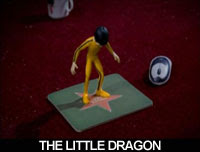The Pope’s Exorcist (2023)
½*/****
starring Russell Crowe, Daniel Zovatto, Alex Essoe, Franco Nero
screenplay by Michael Petroni and Evan Spiliotopoulos
directed by Julius Avery
by Walter Chaw Right off the bat, I feel I must warn you that no popes are exorcised in this film. The prospect of Russell Crowe reading the rites over a levitating, pea-soup spewing Franco Nero, shuttled in to play the Pope in Julius Avery’s The Pope’s Exorcist, is incredibly juicy, so I get why they would attempt to mislead audiences in this way, but it’s terribly dishonest. The cruellest blow, however, is that in place of Franco Nero in his dotage doing a spider-walk downstairs and pissing himself in his papal robes before a drunken astronaut (which, let’s face it, once I hit 82, I can’t promise that won’t just be a Tuesday), we get Crowe, as real-life exorcist Father Gabriel Amorth, riding a Vespa through the streets of Rome, no doubt in search of an espresso, a gelato, spaghetti, and his portly, Vespa-riding twin for the Guinness Book photo shoot. It bears mentioning, too, how Crowe straps on the world’s most offensive Mario Bros. accent to free poor little Henry (Peter DeSouza-Feighoney) from demonic possession. Why is Henry in Rome? Because his mom, Julia (Alex Essoe), is renovating a building, which happens to be the primary reason anyone moves to Italy. (See also: Donald Sutherland’s character in Don’t Look Now and Genevieve Bujold’s character in Obsession and Diane Lane’s character in Under the Tuscan Sun.) There’s probably a piece to be written about how our perception of Italy is of a beautiful place the Italians have neglected, but now that P.J. O’Rourke, who once wrote, “Italy is not a third world country but nobody told the Italians,” is dead, I don’t know who’ll write it.

